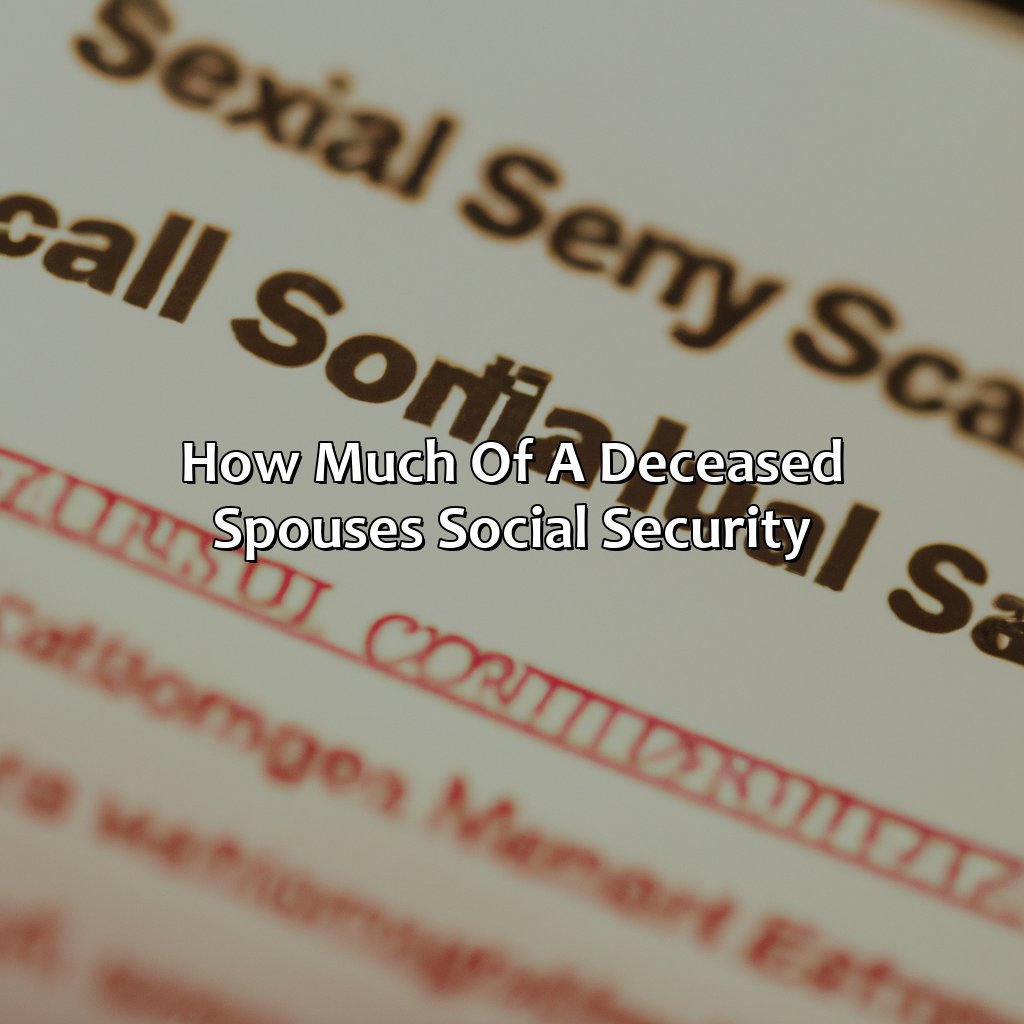How Much Of A Deceased Spouse’S Social Security?
Key Takeaway:
- Widow(er)s may be eligible for Social Security survivor’s benefits.
- Eligibility is determined by factors such as length of marriage and age.
- The amount of survivor’s benefits is calculated based on various factors, including the deceased spouse’s benefits and the reduction factor for taking benefits before full retirement age.
The death of a spouse can be a difficult and traumatic time. You may be unsure of how to manage finances, including social security benefits, during this difficult period. This article will explain how much of a deceased spouse’s social security you may be eligible for.
Overview of Social Security benefits for widow(er)s
Social Security benefits for widows and widowers can be a reliable source of income in retirement. Understanding how the system works can help you make informed decisions.
When a spouse dies, the surviving spouse may be eligible for benefits based on their deceased spouse’s earnings. These benefits can be up to 100% of the deceased spouse’s benefit amount. To be eligible, the surviving spouse must have been married to their deceased spouse for at least nine months and be at least 60 years old (or 50 if they are disabled).
It is important to note that if the surviving spouse remarries before the age of 60 (or 50 if disabled), they may not be eligible for benefits based on their deceased spouse’s earnings. However, if they remarry after that age, they may still be eligible. It’s also worth noting that a surviving spouse can receive benefits even if they also have their own work history and are eligible for their own Social Security benefits.
One real-life example of how Social Security benefits for widows and widowers can be helpful is the case of a woman whose husband passed away when she was in her early 60s. She was able to receive Social Security benefits based on his earnings, which allowed her to retire comfortably and not worry about financial difficulties in her later years.

Image credits: retiregenz.com by Adam Arnold
Determining eligibility for survivor’s benefits
Survivor’s benefits from a deceased spouse’s social security depend on the length of the marriage and age requirements. To see if you’re eligible, find out more about the benefits based on these criteria. Dive into the details!

Image credits: retiregenz.com by David Washington
How the length of marriage affects benefits
When it comes to determining eligibility for survivor’s benefits, the duration of marriage plays a significant role. Here are some ways in which the length of marriage affects benefits:
- The surviving spouse may be eligible to receive up to 100% of their deceased partner’s Social Security benefit if they were married for at least 10 years.
- If the marriage ended in divorce before the death of the ex-spouse, but lasted at least 10 years, the surviving ex-spouse may still be eligible for survivor’s benefits.
- A surviving spouse who was married less than 9 months before their partner’s death may still be eligible if they have a child who is under age 16 or disabled and receiving Social Security benefits.
- If someone is widowed more than once, they can choose which deceased spouse’s benefit to receive as long as each marriage reached the minimum threshold of 10 years.
- If a couple has been married less than 1 year, but one dies before reaching this milestone, no survivor’s benefit will be paid.
- In certain circumstances, if you remarry after age 60 (or age 50 if you are disabled), you can still collect survivor benefits based on your former spouse’s earnings record.
It is important to note that while these rules apply to most cases, there may be exceptions depending on individual circumstances. It is always best to consult with a Social Security representative or financial advisor for specific advice.
In its first year of operation, Social Security paid out $35 million in survivor’s benefits. The Social Security program has provided financial security for millions of Americans over its more than eighty-year history.
After death, the only thing that matters for survivor’s benefits is your age, not your stage of grief.
Age requirements for survivor’s benefits
Survivor’s benefits eligibility age differs based on the social security account of the deceased spouse. Generally, a widow or widower may receive full benefits at full retirement age or reduced benefits as early as ages 60 to 50 if disabled. A surviving spouse can get benefits as early as age 50 if they are disabled/retired and caring for children under 16 or within two years of childbirth.
If a widow or widower is entitled to retirement benefits based on own work, which are greater than the survivor’s benefit, then they will not receive both amounts. The amount of the survivor benefit is determined by elements such as lifetime earnings of the deceased spouse and the survivor’s chosen age to take-off benefits.
An individual should apply for surviving spouse benefit to Social Security Administration, regardless they die in office or not. They can help verify if an individual qualifies for any other forms of social security payments like disability insurance (SSDI) or supplemental security income (SSI).
Pro Tip: Make sure you have all necessary documentation like death certificate and other relevant documents when applying for survivor’s benefits eligibility.
Getting a piece of the pie from a deceased spouse’s social security? It’s like trying to calculate how much frosting you can scrape off a cake without anyone noticing.
Calculating survivor’s benefits
Survivor’s benefits after a spouse passes away can be calculated. To do this, understand the reduction factor for taking benefits before full retirement age. Also, be aware of how the deceased spouse’s benefits affect yours.
This guide will help you with the process. It is divided into two sub-sections.

Image credits: retiregenz.com by Joel Arnold
The reduction factor for taking benefits before full retirement age
To calculate your survivor benefits, you must consider “The reduction percentage for taking benefits before full retirement age.” This factor adjusts the benefit amount according to the number of months before full retirement age you opt to start claiming. The earlier you take benefits, the greater the reduction in payment.
Refer to the below table presenting data for “The reduction factor for taking benefits before FRA” to understand clearly how this factor works. The table showcases a comparison between selecting benefits at 62 years of age and waiting until full retirement age.
| Age | Benefit Type | Benefit Amount | Reduction Percentage | Monthly Payment |
|---|---|---|---|---|
| 62 | Retired worker | $1,000 | 30% | $700 |
| 63 | Spouse | $650 | 25% | $487.50 |
Notably, while overall Social Security payment remains constant over time, early claiming bears a financial penalty with reduced monthly payments permanently.
When you file for Social Security survivor’s benefits early, it is crucial to assess whether this is a profitable choice or not. Therefore my suggestion would be to re-evaluate your choice before making any conclusions by considering:
- Whether your eligibility for this benefit changes over time
- Life expectancy of both spouses
- Whether there are alternative revenue sources available
Remember that a premature decision can be irreversible and hurtful financially in the long term. Taking professional advice from experts can assist in identifying all required aspects more effectively. Hoping your spouse had a high social security payout? Well, in death, as in life, it’s all about the money.
How survivor’s benefits are affected by the deceased spouse’s benefits
Following the loss of a spouse, the surviving partner may be entitled to survivor’s benefits. The amount of these benefits is affected by the deceased spouse’s social security benefits, with the surviving partner eligible for up to 100% of their late partner’s payments. This is referred to as the deceased spouse’s Primary Insurance Amount (PIA).
The PIA is calculated based on the deceased individual’s average lifetime earnings and age at which they claimed retirement benefits. If the surviving partner claims the benefit before reaching full retirement age, their benefit will be reduced. On the other hand, if they wait until after full retirement age, their benefit may increase.
It’s worth noting that receiving survivor’s benefits doesn’t affect a person’s own social security retirement benefits or prevent them from claiming additional spousal benefits.
If you are divorced but were married for over ten years to your former spouse and they have since passed away, you could be eligible for survivor’s benefits based on your late ex-spouse’s record.
In fact, according to research by Edward Jones’ Social Security Strategy: When To Notify Social Security About A Death,“you only need to contact Social Security once—that one call starts and ends everything.”
Survivor’s benefits are like a box of chocolates, you never know what you’re going to get, especially when other factors come into play.
Other factors that may affect survivor’s benefits
Survivor’s benefits are influenced by more than just the deceased spouse’s social security. Factors to consider may include the age and work history of the surviving spouse, disability status, and potential entitlement to other benefits. The timing of claiming survivor’s benefits can also impact the amount received. It is important to carefully evaluate all relevant factors before making a decision.
Additionally, survivor’s benefits may be affected by the date of the deceased spouse’s retirement and whether they had started receiving benefits. If the spouse had delayed collecting benefits, the survivor may be entitled to a higher amount. Conversely, if the deceased had started benefits early, the survivor’s payout may be reduced.
One crucial factor to keep in mind is that survivor’s benefits are subject to taxation. Depending on income levels, a portion of the benefits received may be taxed. It is important to consult with a tax professional to fully understand the impact of survivor’s benefits on overall tax liability.
According to the Social Security Administration, roughly one in nine people aged 60 or older receives survivor’s benefits. These benefits are a vital source of income for many widows and widowers, providing financial stability during a difficult time.

Image credits: retiregenz.com by David Woodhock
Applying for survivor’s benefits
Surviving spouses can apply for benefits based on their deceased partner’s social security earnings. This process involves filling out the necessary forms and providing required documentation. In addition to a lump-sum death payment, monthly survivor’s benefits are provided to eligible individuals.
It is essential to understand the eligibility requirements and how the benefits are calculated, which can vary based on several factors such as the age of the surviving spouse. Applying for survivor’s benefits can be a complex process, and seeking professional advice is highly recommended.
It is crucial to note that the timing of applying for survivor’s benefits can affect the amount received. The longer the surviving spouse waits to apply, the more potential benefits they may receive. Pro Tip: Consider seeking advice from a financial advisor or social security expert before applying to maximize benefits.

Image credits: retiregenz.com by Joel Washington
Five Facts About How Much of a Deceased Spouse’s Social Security:
- ✅ Surviving spouses may be eligible for up to 100% of their deceased spouse’s Social Security benefit. (Source: SSA.gov)
- ✅ The amount a surviving spouse can receive depends on factors such as the deceased spouse’s work history and the surviving spouse’s age. (Source: AARP)
- ✅ If a surviving spouse remarries before age 60 (or age 50 if disabled), they are not eligible for the deceased spouse’s Social Security benefit. (Source: SSA.gov)
- ✅ If a surviving spouse waits until full retirement age to claim the Social Security benefit, they may receive a higher monthly amount. (Source: Investopedia)
- ✅ A surviving spouse may also be eligible for a one-time death benefit of $255. (Source: SSA.gov)
FAQs about How Much Of A Deceased Spouse’S Social Security?
What is the maximum amount of Social Security survivor benefit a widow can receive?
The maximum amount of Social Security survivor benefit a widow can receive is equal to 100% of the deceased spouse’s benefits. However, the amount may be reduced if the widow begins receiving benefits before reaching full retirement age.
Can a divorced spouse collect Social Security benefits from a deceased ex-spouse?
Yes, a divorced spouse can collect Social Security benefits from a deceased ex-spouse if the marriage lasted for at least 10 years and the divorced spouse is at least 60 years old. The benefits will be calculated based on the deceased ex-spouse’s work record.
Can a widow collect her own Social Security benefits and survivor benefits from her deceased spouse’s account at the same time?
Yes, a widow can collect her own Social Security benefits and survivor benefits from her deceased spouse’s account at the same time. However, the total benefit amount may be reduced if the widow begins receiving benefits before reaching full retirement age.
How long do I have to be married to collect Social Security survivor benefits?
You must have been married to your deceased spouse for at least nine months before they passed away to be eligible for Social Security survivor benefits.
Can a remarried widow still collect Social Security survivor benefits from her deceased spouse?
No, a remarried widow cannot collect Social Security survivor benefits from her deceased spouse unless the subsequent marriage ends either through death, divorce, or annulment.
If both spouses are eligible for Social Security benefits, can they both receive their own benefits plus survivor benefits?
No, only one benefit can be received. The Social Security Administration will always pay the higher of the two benefits, whether it is the deceased spouse’s benefit or the surviving spouse’s benefit.


